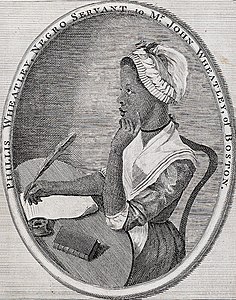Analysis of To Maecenas
Phillis Wheatley 1753 (West Africa) – 1784 (Boston)
MAECENAS, you, beneath the myrtle shade,
Read o'er what poets sung, and shepherds play'd.
What felt those poets but you feel the same?
Does not your soul possess the sacred flame?
Their noble strains your equal genius shares
In softer language, and diviner airs.
While Homer paints, lo! circumfus'd in air,
Celestial Gods in mortal forms appear;
Swift as they move hear each recess rebound,
Heav'n quakes, earth trembles, and the shores resound.
Great Sire of verse, before my mortal eyes,
The lightnings blaze across the vaulted skies,
And, as the thunder shakes the heav'nly plains,
A deep felt horror thrills through all my veins.
When gentler strains demand thy graceful song,
The length'ning line moves languishing along.
When great Patroclus courts Achilles' aid,
The grateful tribute of my tears is paid;
Prone on the shore he feels the pangs of love,
And stern Pelides tend'rest passions move.
Great Maro's strain in heav'nly numbers flows,
The Nine inspire, and all the bosom glows.
O could I rival thine and Virgil's page,
Or claim the Muses with the Mantuan Sage;
Soon the same beauties should my mind adorn,
And the same ardors in my soul should burn:
Then should my song in bolder notes arise,
And all my numbers pleasingly surprise;
But here I sit, and mourn a grov'ling mind,
That fain would mount, and ride upon the wind.
Not you, my friend, these plaintive strains become,
Not you, whose bosom is the Muses home;
When they from tow'ring Helicon retire,
They fan in you the bright immortal fire,
But I less happy, cannot raise the song,
The fault'ring music dies upon my tongue.
The happier Terence* all the choir inspir'd,
His soul replenish'd, and his bosom fir'd;
But say, ye Muses, why this partial grace,
To one alone of Afric's sable race;
From age to age transmitting thus his name
With the finest glory in the rolls of fame?
Thy virtues, great Maecenas! shall be sung
In praise of him, from whom those virtues sprung:
While blooming wreaths around thy temples spread,
I'll snatch a laurel from thine honour'd head,
While you indulgent smile upon the deed.
*He was an African by birth.
As long as Thames in streams majestic flows,
Or Naiads in their oozy beds repose
While Phoebus reigns above the starry train
While bright Aurora purples o'er the main,
So long, great Sir, the muse thy praise shall sing,
So long thy praise shal' make Parnassus ring:
Then grant, Maecenas, thy paternal rays,
Hear me propitious, and defend my lays.
| Scheme | AABBCCXXDDEEFFGGAAXXHHIIXXEEJJXXXXGKLLMMBBKKNNX X HHOOPPQQ |
|---|---|
| Poetic Form | |
| Metre | 11010101 11011010101 1111011101 1111010101 1101110101 01010011 11011101 0101010101 1111110101 11110011 11011011101 0101010101 010101011 0111011111 1101011101 0111110001 11110101 0101011111 1101110111 01111101 11101101 0101010101 111101011 110101011 1011011101 001101111 1111010101 0111010001 111101011 1111010101 1111110101 1111010101 111111001 11010101010 1111010101 0111010111 0100101010010 11010011010 1111011101 110111101 1111010111 10101000111 11011111 0111111101 1101011101 110101111 1101010101 11110011 1111010101 11011101 1101010101 11010101001 1111011111 111111101 11110101 1101000111 |
| Closest metre | Iambic pentameter |
| Characters | 2,425 |
| Words | 425 |
| Sentences | 18 |
| Stanzas | 3 |
| Stanza Lengths | 47, 1, 8 |
| Lines Amount | 56 |
| Letters per line (avg) | 34 |
| Words per line (avg) | 8 |
| Letters per stanza (avg) | 643 |
| Words per stanza (avg) | 141 |
Font size:
Submitted on May 13, 2011
Modified on April 28, 2023
- 2:13 min read
- 162 Views
Citation
Use the citation below to add this poem analysis to your bibliography:
Style:MLAChicagoAPA
"To Maecenas" Poetry.com. STANDS4 LLC, 2024. Web. 17 Jun 2024. <https://www.poetry.com/poem-analysis/29390/to-maecenas>.


Discuss this Phillis Wheatley poem analysis with the community:
Report Comment
We're doing our best to make sure our content is useful, accurate and safe.
If by any chance you spot an inappropriate comment while navigating through our website please use this form to let us know, and we'll take care of it shortly.
Attachment
You need to be logged in to favorite.
Log In